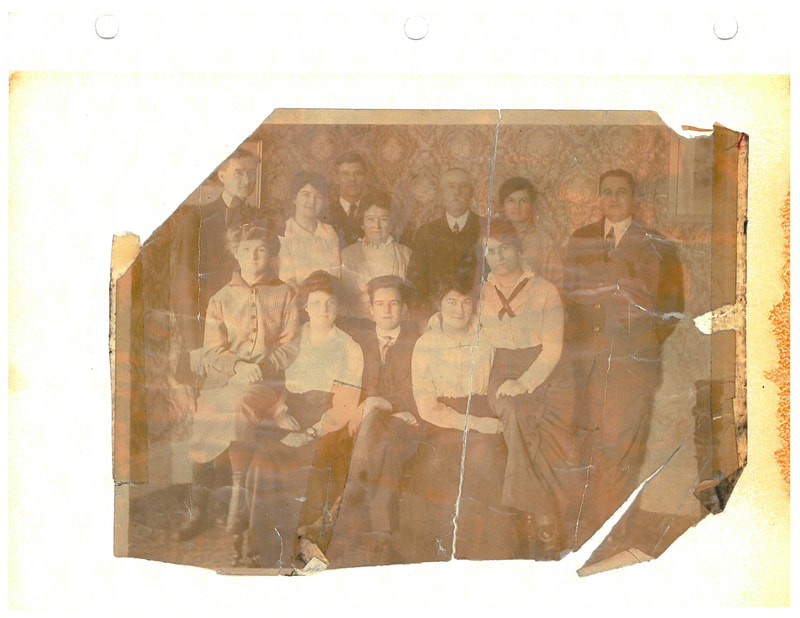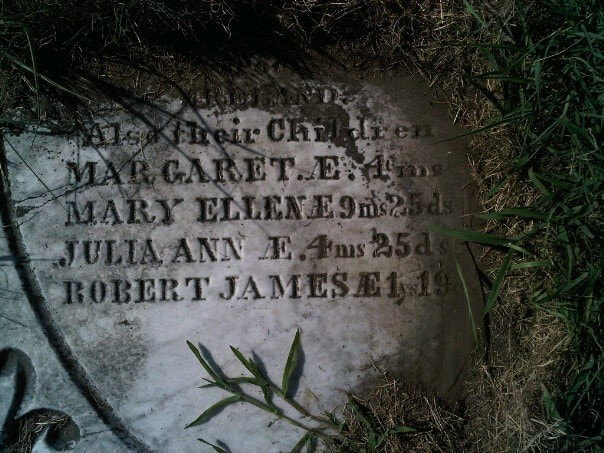|
Above: My great grandparents Michael McDonnell and Theresa (Doherty) McDonnell, circa 1920, Lawrence, Mass., surrounded by a number of their children and spouses. My grandfather is behind and to the left of his mother in the back. You asked me about my family history. Or I presume you did, otherwise you would not have showed up here. I grew up in a unique place. I grew up among ghosts. They were left by previous generations through their stories. When I was little, my father would drive around my hometown of Lawrence, Mass. and tell the story on every corner about something that happened there to him, or to his father or his mother. The same was true for my mother. They had each left Lawrence for the big wide world, my father to the Marine Corps, U. Chicago and beatnik travels and my mother to a schoolteacher job on Long Island and cruises on the Queen Mary to Europe, but each had come back. They had returned to a town that barely existed in its prior form, yet which carried the narrative of all prior generations. The collective story of Lawrence as told through my ancestors is one of migrants from far or near being caught the industrial town and staying there for generations. This fate is not as grim as it seems; the industrial town was the source of all forms of economic activity. There were shops, there was commerce and there was some higher education in addition to the factories. On my mother's side, the story begins with the Irish potato famine. Her forebears, Irish all of them (and Catholic) were usually illiterate and had almost to a person arrived in the late 1840s. Interestingly, from the earliest generations there was a streak of the entrepreneurial. Her great grandfather John McDonnell and his wife ran a boarding house on Broadway in Methuen just over the town line with Lawrence. It is recorded in the census. This line of business was again pursued by her father's parents with a boardinghouse on Broadway across from the massive Arlington Mills complex, employer of 4,000 workers at its heyday around 1920. Said paternal grandfather also ran a butcher business, and after that he was an undertaker. On my mother's mother's side, too, there was a streak of enterprise with some focus on hospitality. Although the immigrant progenitor, one Jerry Driscoll, was but a laborer, he sold his services to the Union Army for $300 in 1863 and then used the proceeds to buy some land, including the land under the house into which my mother was born. Jerry's extensive lands in North Andover became the seed capital for his three sons: a builder, a dairy farmer and my mothers grandfather, a saloon keeper. My mother's parents, hoteliers and smalltime real estate developers of the New Hampshire seacoast, were therefore a match well-destined. The story of my mother's father is worth mentioning, since he was not more than a boy when he entered the mills in Lawrence around 1903 after leaving the eighth grade. However it must've been an arrangement, because instead of working a loom, he worked as an apprentice carpenter and machinist -- a job normally reserved for Protestant citizens. Family legend has it that he was mistaken for a Scotsman by confusion over his surname: McDonnell instead of McDonald, allowing him to get a better job. Or maybe this was just the cover arranged by a family friend. In any case, as a result of his training in the mills as a carpenter and machinist, by age 30 he had amassed enough fortune to purchase and build the first motel in New Hampshire, the Sunrise Motor Court in Hmapton Beach, a burgeoning local vacation destination for millworkers made possible by the advent of the motorcar. Joseph's eleven brothers and sisters also led equally fruitful and successful lives. As the stereotypically lazy third generation of Americans, they nevertheless assimilated and got along very well in the larger economy, becoming such things as a potato chip dealer and manufacturer; a soda manufacturer and distributor; a college-educated school teacher; and car salesman. In short, they were the type of generally successful and solid citizens. 1850s grave of Irish infants in one family, from the old section of the Immaculate Conception Cemetery in Lawrence, Mass. Photo by the author.
0 Comments
Leave a Reply. |
|


 RSS Feed
RSS Feed